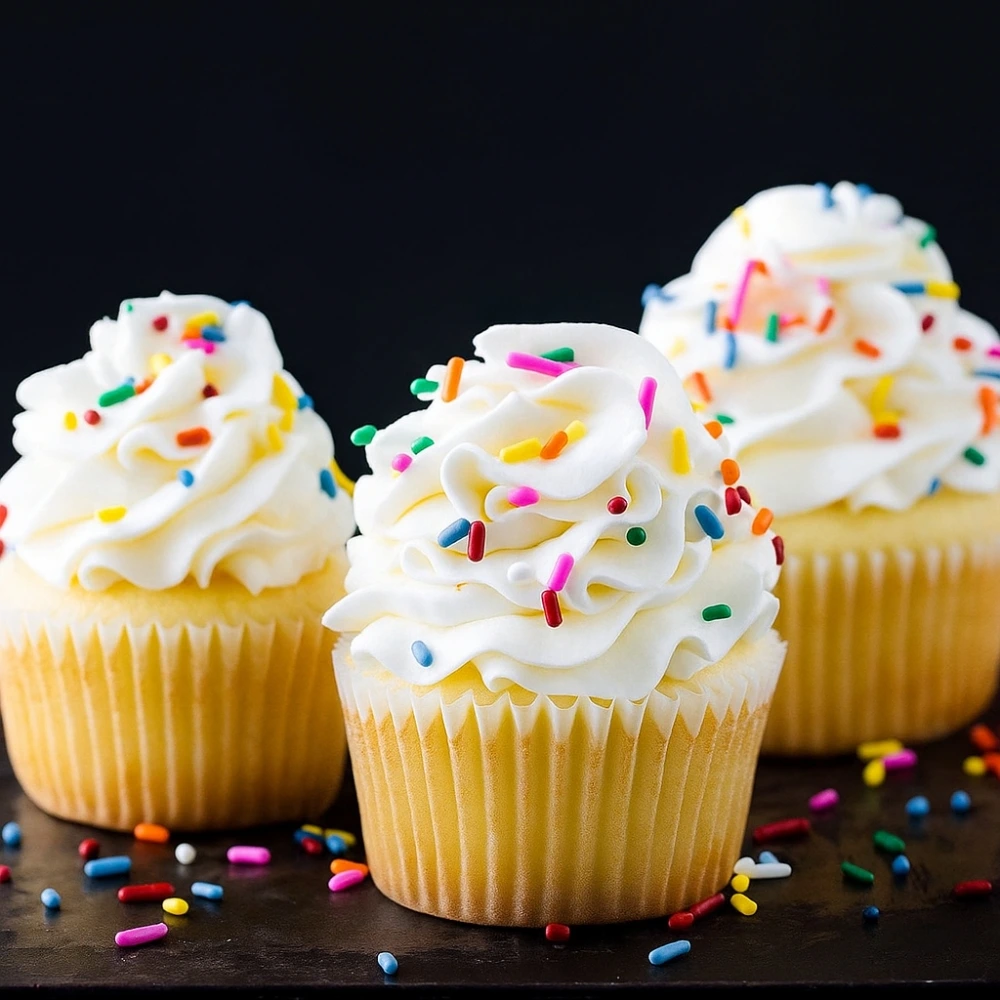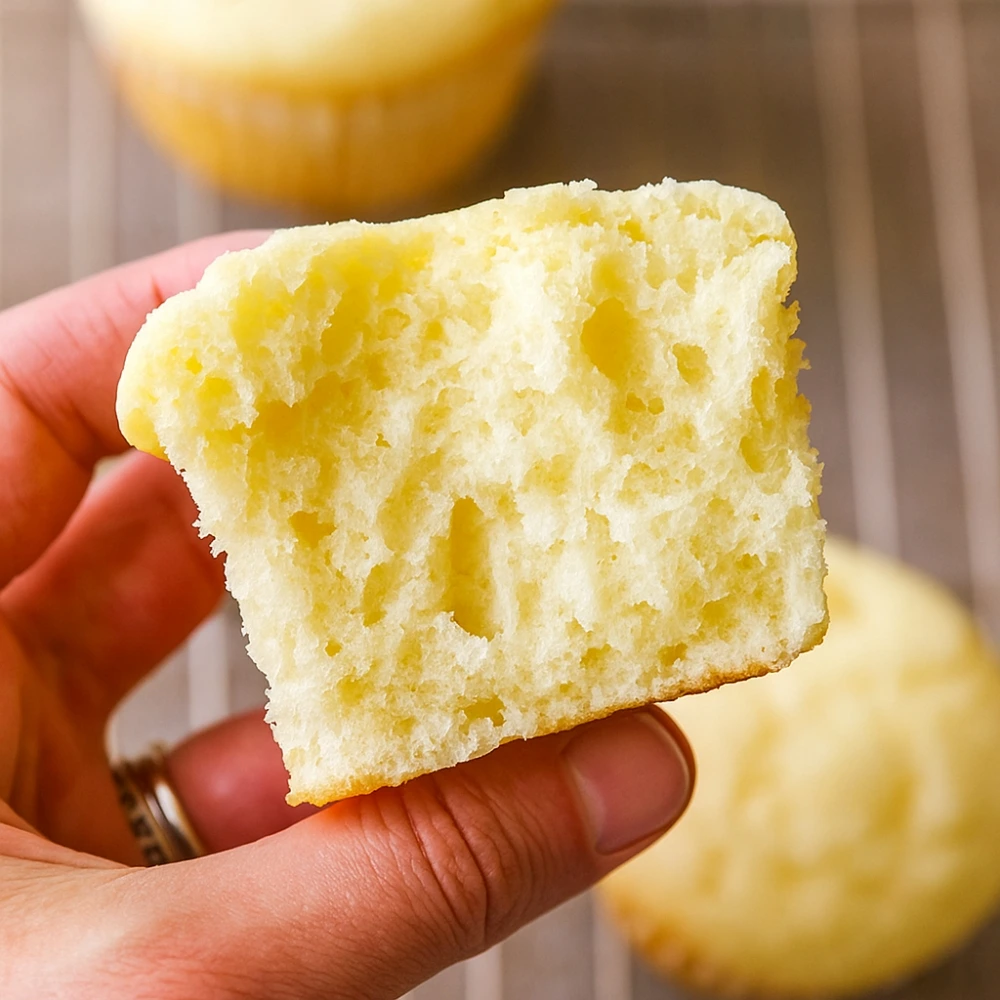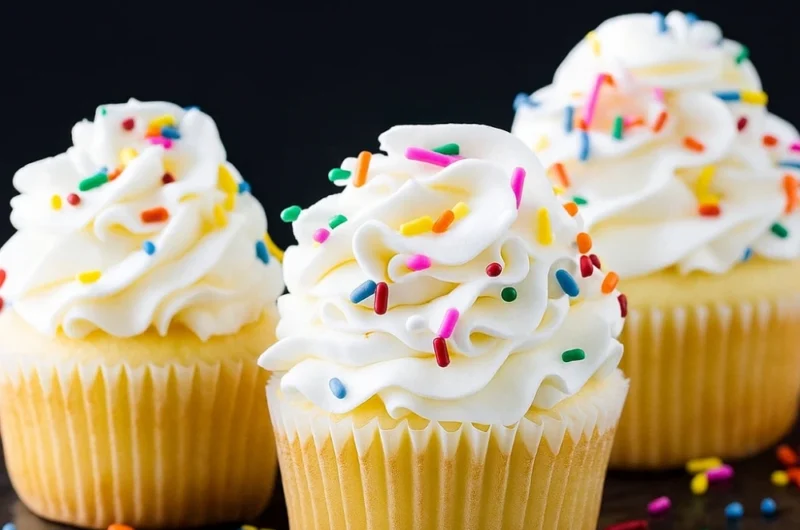The Best Fluffy Pancakes recipe you will fall in love with. Full of tips and tricks to help you make the best pancakes.
The Last Vanilla Cupcake Recipe You’ll Ever Need: A Complete Guide

After testing over 47 different vanilla cupcake recipes and enduring countless kitchen disasters (including one memorable incident involving exploding cupcakes), I finally cracked the code. This isn’t just another vanilla cupcake recipe—it’s your foundation for creating endless variations of perfectly moist, fluffy cupcakes that will make people think you’re a professional baker.
Whether you’re a beginner baker looking for foolproof results or an experienced home cook seeking the perfect base recipe, this comprehensive guide delivers more than just measurements. You’ll discover the science behind perfect cupcakes, troubleshoot common problems, and unlock dozens of delicious variations using one master recipe.
The Science of Perfect Vanilla Cupcakes
Before we dive into the recipe, let’s understand what makes a cupcake truly exceptional. The perfect vanilla cupcake balances four key elements: moisture, texture, flavor, and structure. Each ingredient plays a specific role in achieving this balance.
Interactive Ingredient Breakdown
| Ingredient | Imperial | Metric | The Role | Common Substitutions |
|---|---|---|---|---|
| Cake flour | 1¾ cups | 210g | Provides tender, fine crumb due to lower protein content | All-purpose flour: Use 1½ cups + 3 tbsp, sift 3 times |
| Granulated sugar | 1 cup | 200g | Sweetens and helps create structure through creaming | Caster sugar works equally well |
| Unsalted butter | ½ cup | 113g | Adds richness and helps trap air for leavening | Room temperature is crucial for proper creaming |
| Large eggs | 2 whole | ~100g | Provides structure, moisture, and richness | Must be room temperature for best incorporation |
| Buttermilk | ½ cup | 120ml | Adds tang and reacts with baking soda for lift | Make your own: 1 tbsp lemon juice + milk to ½ cup |
| Whole milk | ¼ cup | 60ml | Adds moisture and richness | 2% milk works, avoid skim |
| Pure vanilla extract | 2 tsp | 10ml | Provides signature flavor | Never use imitation—it’s worth the investment |
| Baking powder | 1½ tsp | 7g | Primary leavening agent | Must be fresh (replace every 6 months) |
| Baking soda | ¼ tsp | 1g | Reacts with buttermilk for additional lift | Works with acidic ingredients |
| Salt | ½ tsp | 3g | Enhances all flavors and strengthens gluten structure | Fine sea salt or table salt |
DIY Substitutions That Actually Work
Homemade Cake Flour: Measure 1 cup all-purpose flour, remove 2 tablespoons, and add 2 tablespoons cornstarch. Sift together 3 times.
Homemade Buttermilk: Add 1 tablespoon fresh lemon juice or white vinegar to ½ cup whole milk. Let sit 5 minutes until slightly thickened.
Step-by-Step Visual Instructions
Step 1: Prepare Your Setup
Preheat oven to 350°F (175°C). Line a 12-cup muffin tin with paper liners.
Pro Tip: Use high-quality paper liners that won’t peel away from your cupcakes. Avoid generic dollar store liners—they often leave residue.
Step 2: The Critical Creaming Method
In a large bowl, cream butter and sugar with an electric mixer for 4-5 minutes until pale and fluffy.
Science Corner: The creaming method isn’t just mixing—it’s mechanically forcing air into butter and sugar, creating thousands of tiny pockets that expand in the oven for natural leavening. Under-creamed = dense cupcakes.
Step 3: Incorporate Eggs Perfectly
Add eggs one at a time, beating well after each addition. Mix in vanilla extract.
Pro Tip: Room temperature eggs incorporate better. Forgot to take them out? Place whole eggs in warm water for 5 minutes.
Step 4: The Alternating Method
In a separate bowl, whisk together cake flour, baking powder, baking soda, and salt.
Combine buttermilk and milk in a measuring cup.
Add dry ingredients to butter mixture in three additions, alternating with wet ingredients in two additions. Begin and end with flour mixture. Mix just until combined.
Science Corner: Alternating prevents overmixing, which develops gluten and creates tough, chewy cupcakes. Stop mixing as soon as you don’t see dry flour.
Step 5: Perfect Portioning
Using a 20 ice cream scoop (about 3 tablespoons), divide batter evenly among prepared cups, filling each about ⅔ full.
Pro Tip: An ice cream scoop ensures perfectly uniform cupcakes. No scoop? Use a ¼ cup measuring cup—slightly underfill it.
Step 6: The Baking Sweet Spot
Bake for 18-20 minutes, until a toothpick inserted in the center comes out with just a few moist crumbs.
Pro Tip: Don’t overbake! Cupcakes continue cooking from residual heat. They’re done when they spring back lightly when touched.

The Game-Changer: Endless Variations Hub
Transform your master vanilla cupcakes into exciting new flavors with these tested variations:
Funfetti Birthday Cupcakes
Add ½ cup rainbow sprinkles to the batter after Step 4. Use gel food coloring for vibrant colors that won’t affect texture.
Lemon Poppy Seed Delights
Add 1 tablespoon fresh lemon zest and 1 tablespoon poppy seeds. Replace vanilla with lemon extract for intense citrus flavor.
Coffee Shop Mocha Cupcakes
Replace 2 tablespoons buttermilk with 2 tablespoons strong cooled coffee. Add 2 tablespoons cocoa powder to dry ingredients.
Chocolate Chip Cookie Cupcakes
Fold ¾ cup mini chocolate chips into finished batter. The smaller chips distribute more evenly than regular-sized chips.
Strawberry Shortcake Cupcakes
Add ½ cup finely diced fresh strawberries and 1 teaspoon strawberry extract. Reduce milk by 2 tablespoons to compensate for fruit moisture.
Brown Butter Vanilla Cupcakes
Brown the butter in a saucepan until golden and fragrant. Cool completely before using. This adds incredible nutty depth.
Almond Joy Cupcakes
Replace vanilla with almond extract. Fold in ⅓ cup shredded coconut and ¼ cup mini chocolate chips.
Ultimate FAQ & Troubleshooting Guide
Why are my cupcake liners greasy?
Solution: Use high-quality paper liners and avoid overfilling. Generic liners often have poor grease resistance.
Can I make these gluten-free?
Yes! Replace cake flour with this tested blend:
- 1 cup rice flour
- ½ cup potato starch
- ¼ cup tapioca flour
- 1 teaspoon xanthan gum
My cupcakes are dense. What went wrong?
Common causes:
- Overmixing the batter
- Using cold ingredients
- Expired baking powder
- Too much flour (measure by weight when possible)
Can I use a stand mixer vs. hand mixer?
Both work! Stand mixer: Use medium speed. Hand mixer: Use high speed but watch for overmixing.
How do I store cupcakes to prevent drying?
Storage tips:
- Unfrosted: Airtight container, room temperature, 3 days
- Frosted: Refrigerate in airtight container, 5 days
- Freeze: Wrap individually, freeze up to 3 months
Why did my cupcakes sink in the middle?
Troubleshooting:
- Oven temperature too high
- Overmixing incorporated too much air
- Opening oven door too early
- Old baking powder
Can I double this recipe?
Absolutely! This recipe doubles perfectly. Use two 12-cup muffin tins and rotate halfway through baking for even results.
My cupcakes stuck to the liners. Help!
Prevention:
- Let cupcakes cool completely before removing liners
- Use parchment paper liners instead of regular paper
- Lightly spray liners with cooking spray
Pro Baker Secrets for Next-Level Results
Temperature Matters
All ingredients should be at room temperature (68-72°F) for optimal mixing and texture. Cold ingredients don’t combine properly, leading to uneven texture.
The Toothpick Test Decoded
- Completely clean: Overbaked and dry
- Wet batter: Needs more time
- Few moist crumbs: Perfect!
Altitude Adjustments
Above 3,000 feet:
- Reduce baking powder by ¼
- Increase liquid by 2-4 tablespoons
- Reduce sugar by 2 tablespoons
- Increase oven temperature by 15-25°F
Frosting Pairing Guide
| Cupcake Variation | Perfect Frosting Match |
|---|---|
| Classic Vanilla | American Buttercream or Cream Cheese |
| Funfetti | Vanilla Buttercream with sprinkles |
| Lemon Poppy Seed | Lemon Cream Cheese Frosting |
| Coffee Mocha | Espresso Buttercream |
| Chocolate Chip | Peanut Butter Frosting |
| Strawberry | Fresh Strawberry Buttercream |
The Bottom Line
This master vanilla cupcake recipe isn’t just about following directions—it’s about understanding the science behind perfect baking. With proper technique and quality ingredients, you’ll create bakery-worthy cupcakes that serve as the foundation for countless variations.
Remember: baking is both art and science. Measure accurately, use room temperature ingredients, don’t overmix, and trust the process. Your perfect cupcake journey starts with mastering this base recipe.
Ready to get started? Gather your ingredients, preheat that oven, and prepare to create cupcakes that will have everyone asking for your secret. The secret? It’s all in the details, and now you have them all.
Have you tried this recipe? Share your results and variations in the comments below! For more expert baking guides and foolproof recipes, subscribe to our newsletter for weekly kitchen wisdom delivered straight to your inbox.
The Last Vanilla Cupcake Recipe You’ll Ever Need: A Complete Guide
Course: cake ideas, DessertsCuisine: American12
Cupcake15
minutes20
minutes200
kcalIngredients
1 1/2 cups all-purpose flour
1 1/2 teaspoons baking powder
1/4 teaspoon salt
1/2 cup unsalted butter, softened
1 cup granulated sugar
2 large eggs
2 teaspoons vanilla extract
1/2 cup whole milk
Directions
- Preheat the oven to 350°F (175°C) and line a muffin pan with cupcake liners.
- Whisk together the flour, baking powder, and salt in a bowl; set aside.
- Cream the butter and sugar together in a separate bowl until light and fluffy (about 2–3 minutes).
- Add the eggs one at a time, beating well after each addition. Stir in the vanilla extract.
- Gradually add the dry ingredients to the wet ingredients, alternating with the milk, beginning and ending with the dry ingredients. Mix until just combined.
- Divide the batter evenly among the cupcake liners, filling each about 2/3 full.
- Bake for 18–20 minutes, or until a toothpick inserted into the center comes out clean.
- Cool in the pan for 5 minutes, then transfer to a wire rack to cool completely.
- Frost with your favorite buttercream or frosting once fully cooled.

